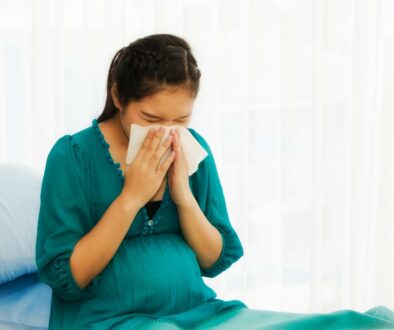Viral Illnesses During Pregnancy: Safe Symptom Relief
When you encounter a viral illness during pregnancy, you often wonder what is the best way to find symptom relief without harming the baby. We understand that colds, flu and other common illnesses during pregnancy are not unusual, and we want to assure you that we’re always here for you if you have any questions.
Because we get asked so many questions about what is safe to take during pregnancy, we’ve compiled this useful guide for you.
How to Get Relief from Viral Illnesses During Pregnancy
You’ll find that many natural and over-the-counter remedies work just fine. We do ask that you remember that a viral illness during pregnancy does not respond to antibiotics, and typically has to “run its course.” Here are our useful suggestions:
How to Get Relief from a Cough
Try the following:
- Herbal tea with honey
- Elderberry syrup
- A tablespoon of apple-cider vinegar and tablespoon of honey in a mug of steaming water
- Any OTC cough syrup containing dextromethorphan and/or guaifenesin (Robitussin, Delsym, Mucinex)
Cold Symptom Relief During Pregnancy
To help relieve your congestion, try:
- A room humidifier, plenty of hot steamy showers
- A “steam tent” with 5 drops of tea-tree oil, or eucalyptus oil in a bowl of very hot, steaming water (cover your head and the bowl with a towel and breathe)
- Neti-pot, or sinus rinse
- Nasal decongestant spray containing oxymetazoline (Afrin), not more than 3-5 days due to risk of dependence
- Antihistamines containing diphenhydramine (Benadryl)
- Occasional use of pseudoephedrine (Sudafed) if you don’t have high blood pressure
Sore Throat Symptom Relief During Pregnancy
We recommend the following:
- Gargle with 1 tsp. of salt in 8 oz. of very warm water Sip on hot chicken, beef, or vegetable broth
- Any over the counter throat lozenge, spray, or cough drop
- Acetaminophen (Tylenol) as directed on the bottle, to a maximum of 4 grams/day
If symptoms are worsening or severe, you have asthma, smoke, or are having difficulty breathing, please call the office. Prescription medications may be needed in some circumstances.
Medicines You Should NOT Take During Pregnancy
Medicines you should AVOID during pregnancy include:
- Ibuprofen (Advil, Motrin)
- Aleve (Naproxen)
- Powders, and medicines containing bismuth or salicylates (Pepto-Bismol)
However, it’s important to also note that: Aspirin is different from both Tylenol and Ibuprofen and should be discussed on an individual basis with your provider before you consider taking it.
Symptoms and Treatment For the Flu While Pregnant
The flu is one of the most common viral illnesses during pregnancy. Pregnant people are considered a high-risk group and are more likely to develop complications from influenza infection. Please consider a flu shot if you haven’t had one. You cannot get the flu from a flu shot. You may have mild muscle aches and a temperature of 99.0 for the 24-48 hours it takes for your body to process the shot. This is a normal response.
Most people with the flu develop:
- Fever >100.0
- Body and muscle aches
You may also experience:
- Sore throat
- Nasal congestion
- Cough Fatigue
- Headache
- Nausea and vomiting
Pregnant women with the flu, or directly exposed to someone with the flu, may need a prescription for Tamiflu. Please call the office, see your PCP, or visit a “Minute Clinic” for diagnosis and treatment of the flu during pregnancy.
However, the simplest solution for treating viral illnesses during pregnancy is to take some basic proactive precautions to help ensure that you’ll stay healthy during cold and flu season.
What to Do in Case of a COVID Infection While You’re Pregnant
Remember, that if you get a COVID infection while pregnant, you’re more likely to develop serious illness, need a breathing tube, or to suffer fatal complications. Fortunately for most, particularly if you are vaccinated and boosted, symptoms are mild and will resolve on their own. You can use the comfort measures and OTC remedies above.
This is one reason why it’s so important to get early testing if you’re exposed or have any COVID symptoms. You can visit the website for the Centers for Disease Control for more information about isolation and quarantine guidelines.
For the safety of our patients and employees, please let us know if you’ve tested positive for COVID or if you have had close contact with someone who tested positive.
In addition, please let us know as soon as possible if you develop any of the serious symptoms of COVID listed below:
- Experiencing increasing shortness of breath or difficulty breathing
- Persistent pain or pressure in the chest.
- Confusion
- Inability to wake or stay awake
- Bluish lips or face
Duke medical system has a limited quantity of monoclonal antibodies available, and they are giving priority to pregnant women who may need it. IV infusion of these antibodies may help the body fight off infection. Both monoclonal antibodies and the antiviral medications have emergency FDA approval, but it’s unclear how beneficial they are against the different viral strains.
Antiviral medications are sometimes administered in an inpatient setting. Treatment of severe illness is managed in the emergency room, or hospital setting. We do not provide evaluation or treatment in our office.
We Recommend COVID and Flu Vaccination for Our Pregnant Patients
We strongly recommend the COVID vaccine for our pregnant patients. COVID vaccine safety is established, it is FDA approved, and is very effective at preventing severe infection, and death from COVID infection. Complications from the vaccine are rare, and the benefits far outweigh the risks.
Basic Precautions to Avoid Viral Illnesses During Pregnancy
We highly recommend that you do the following:
Wear a Surgical Mask—But Wear It Properly
Often, we see people wearing a mask that only covers the mouth. Remember, to be effective, the mask must cover both your nose and mouth. Cloth masks are not as effective as N-95 or other surgical masks.
Wash Your Hands
Regular handwashing with soap and water is vital in order to prevent the spread of germs. Remember to be sure to wash your hands properly: Many people do not wash their hands long enough. (You can check out the Centers for Disease Control’s tips on handwashing for more information. )
Get Vaccinated for the Seasonal Flu and COVID-19
It’s important that not just you get vaccinated, but that everyone in your family is as well. If you are sick, whether it’s from the seasonal flu or COVID, remember to isolate yourself.
Take Care of Yourself
It’s way too easy to forget this one! Remember that you need to get a healthy amount of sleep, eat nutritious foods and keep your stress level under control. Regular exercise is also a good way to take care of your body. If you’re concerned about what exercises are safe during pregnancy, just contact us.
We’re By Your Side to Help With Respiratory Illnesses During Pregnancy
No one wants to be sick with the flu, cold or sore throat. When you’re pregnant, it’s important to take precautions when treating these illnesses.
But don’t worry. We’re here to help. If you’re concerned about any aspect of your pregnancy, we encourage you to contact us.




